Environmental science graduates have gone on to work in government, at engineering firms, within nonprofits, in academia and much more.
Get to know a few of our incredible alumni.
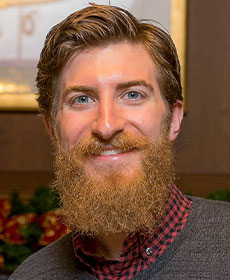
Steve Epting '09
Steve, an environmental science major, went on to work as a field biologist technician at the Wildlife Conservation Society followed by a more than 3-year position as an ORISE Fellow with the U.S. Environmental Protection Agency before pursuing his master's degree at the University of Maryland College Park. He's now a biologist involved the Healthy Watersheds Program at the EPA.
Q&A with Steve
What were some of the most memorable parts for you as an environmental science major at Muhlenberg?
I really appreciate having been part of a small, tight-knit group of environmental science majors. I was really active in the Environmental Action Team (EnAcT), which not surprisingly had a lot of overlap with EnviSci majors. It was a great experience to be learning about environmental issues alongside friends in class, then work to increase awareness of these issues across campus. Here's a quick rundown of some other key memories: learning Geographic Information Systems in the then-brand new GIS lab, field trips to Graver Arboretum and Hawk Mountain, attending the Ecological Society of America (ESA) annual conference with Dr. Niesenbaum, watching the Doctors of Rock band perform (direct all questions to Dr. Kelsey), etc.!
How did your major in environmental science prepare you for your current position?
Two of the biggest parts of my job at EPA hinge on skills I developed at Muhlenberg: synthesizing large amounts of information and communicating with others via writing and presentations. I think receiving an environmental science degree from a liberal arts college really helped prepare me to do both of these things well. I really appreciate having had a true interdisciplinary educational experience at Muhlenberg, which included both courses in the sciences as well as other departments. In my current job I'm regularly pulling information together from a range of sources, including peer-reviewed science articles, legal documents, etc., to help develop environmental program policies in the government. It's equally important to be able to clearly communicate these policies to others.
Was there a course you took at Muhlenberg that changed your life? Please tell us about it.
There were many! Dr. Iyengar's Freshwater Ecology (BIO 281) course really inspired me to make water a core part of my professional career. I still remember collecting macroinvertebrates from local streams around Muhlenberg, then bringing them back to the lab to identify what we found. I was really struck with how the diversity and numbers of bugs could help determine the health of a stream. I participated in the first 'Climate Change and Sustainable Development in Bangladesh' short-term study abroad course offered by Dr. Gambino and Dr. Hashim. I still regularly think about our visits to communities experiencing the impacts of sea level rise. It was life-changing hearing from community members whose lives were directly impacted by the choices of individuals and countries across the globe.
Did you have a favorite instructor or mentor? Who were they and how did they help you?
It's hard to pick one! I remember regularly following Dr. Kelsey back to his office after class to pose an endless series of questions about environmental problems facing society, inspired by class lectures. Similarly, I spent a lot of time with Dr. Niesenbaum as a part of his summer research group and working on campus sustainability issues together. I really appreciate having had the chance to build close relationships with a number of professors, many of whom I consider mentors. This is something I've come to appreciate even more after receiving my Master's degree from a much larger university where these types of opportunities seemed more limited.
What advice do you have for today’s environmental science students?
As you'll hear from most (older, including me!) folks on the other side, college is an incredibly special time where your job as a student is to take in the world around you as you chart your course in life. If you have time, register for classes that interest you, even if you don't think you'll pursue that subject after college. I'd also really encourage students to pursue opportunities to get off campus to expand your learning. I'm really glad I spent a semester abroad in Tanzania as part of the School for Field Studies Program. I also participated in Muhlenberg's short-term study abroad course to Bangladesh. If you aren't able to study abroad there's still a ton of value getting off campus around Allentown to volunteer, participate in an internship, etc.
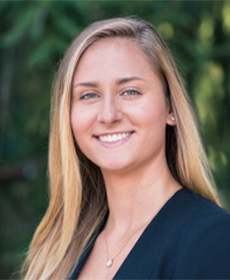
Kristen Wainwright '18
Kristen, an environmental science major, graduated Muhlenberg and then finished the dual-degree program at Columbia University for Earth & Environmental Engineering, graduating with her second Bachelor’s degree in 2020. She is currently an Assistant Engineer at Hazen and Sawyer, where she works on both design and sustainability aspects of wastewater and drinking water infrastructure projects across the country. She holds both an Engineer in Training (EIT) certification (which she intends to turn into a Professional Engineer (P.E.) certification in a few years time) and a LEED Green Associate certification.
Q&A with Kristen
What were some of the most memorable parts for you as an environmental science major at Muhlenberg?
While Muhlenberg is more of a community than a college, the Environmental Science Program truly embodies that of an academic family. Faculty and staff of the department allowed for the opportunity for me to feel like a true academic, consistently inspired to find connections between Environmental Science and sectors outside of the life sciences, and capable enough to ask questions instead of simply accepting textbook language. My peers became study buddies, and later, long-term friends. The major, material, and learning style of the overall department are inherently unique due to the type and degree of field work, making your studies that much more real and tangible to everyday life. Although one of the smaller majors on campus, I would argue it is one of the strongest majors to have your name next to.
How did your major in environmental science prepare you for your current position?
A background in environmental science makes one curious, passionate and always looking to make a solution better. For me in my current position, there are numerous solutions, for example, to treat drinking water effectively for those receiving supplies downstream. My training in environmental science draws me to ask “what is the most energy-reducing, resource-conserving, emissions-avoiding, and overall healthiest option for the local environment and community that also considers project cost restrictions and client requests?” instead of simply checking a box and staying in budget. Involving multiple factors forces you to become more creative, and I pride myself on my environmental science background for teaching me to ask about the interactions between sectors that may not directly be involved in project scope.
Was there a course you took at Muhlenberg that changed your life? Please tell us about it.
While it is difficult for me to pinpoint one course in the curriculum that impacted me the most, the numerous laboratory days across the courses showed me aspects of my future career that I wanted. While in the moment it provided an opportunity to escape an enclosed classroom setting, it showed me that I would enjoy a mix of computer and field work in my future career. Being able to experience what I learn about truly solidifies my knowledge on the topics, making me both a better student and engineer.
Did you have a memorable instructor or mentor? Who were they and how did they help you?
My most influential instructor was undoubtedly Prof. Karen Tuerk. She didn’t just lecture - she taught. We were never spoken at, but instead encouraged to discuss topics during class and ponder their influence beyond the boxes they were being put in for lecture-purposes. While the learning environment she created for me within the classroom allowed for my academic success at Muhlenberg, it was her infectious mindset to lean into what you are passionate about that brought me to where I am today.
What advice do you have for today’s environmental science students?
Every student, especially those studying environmental science, should work to understand how their knowledge can be put to use in different fields. Once you leave school, you quickly learn how everything is interconnected. Finding a holistic and integrative path that allows you to utilize your unique environmental science skills not only yields gratifying work for you personally, but benefits populations on a much larger scale.
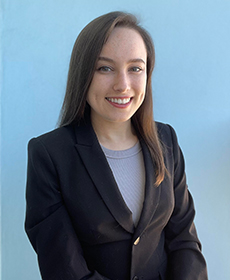
Jadmin Mostel '16
Jadmin majored in environmental science and double-minored in public health and sustainability studies. After graduation, she worked at a cancer non-profit before obtaining a Master's in Public Health from Johns Hopkins University. She is currently working with Population Services International on a USAID malaria project.
Q&A with Jadmin
What were some of the most memorable parts for you as an environmental science major at Muhlenberg?
I have so many memorable moments as an environmental science major! In terms of classwork, I absolutely loved environmental science labs because it meant going outside and exploring the subject matter outside of the classroom. I always looked forward to labs due to the hands-on approach of learning the material. Secondly, majoring in environmental science is what led me to study abroad in Peru through the School for Field Studies in an environmentally-focused program. In Peru, I did research that blended environmental science and public health together, which is what ultimately led me to pursue my career in public health. Lastly, I obtained a summer research grant through Muhlenberg to do research with Professor Tuerk about acid rain. It was an amazing opportunity to experience conducting scientific research, and I found it so valuable to be mentored by and to learn from Professor Tuerk.
What advice do you have for today’s environmental science students?
My advice is to completely immerse yourself in opportunities that both the environmental science program and Muhlenberg offer, and to pursue the facets of environmental science that make you the most excited. Environmental science is such a diverse field, and I think exposing yourself to as many different areas as possible will help you narrow your focus and inform you about how you want to apply your environmental knowledge in your career.
Jacob Glass '13
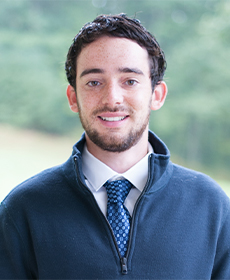
Jacob currently works at the White House Office of Management and Budget (OMB) in the Natural Resources Division. He reviews policy, regulatory, management and budget issues related to the U.S. Department of the Interior. Previously, Jacob worked on EPA issues at OMB, served as a policy analyst in the Office of the Secretary at the U.S. Department of Transportation, and was a Truman-Albright Scholar at the Woodrow Wilson International Center for Scholars. Jacob graduated from Muhlenberg College and received a Master’s from Harvard University. Jacob is a Truman Scholar, a Switzer Fellow, a former Presidential Management Fellow, and a Morris K. Udall Scholar.
Q&A with Jacob
What advice do you have for today’s environmental science students?
I would advise students to be curious about (and explore!) the broad context within which environmental issues exist. Careers utilizing environmental science skills also require an understanding of how the natural world is impacted by different human/social forces, and vice versa. For example, understanding the dangers of lead in drinking water is critical...but it is also important to understand the social and political dynamics at play that led to the crisis in Flint, Michigan. One of Muhlenberg's unique strengths is that the college provides students incredible opportunities to become truly interdisciplinary learners. Take advantage by trying new classes outside of your comfort zone. Or discuss an additional minor/major with your advisor that can help supplement what you will learn in the Environmental Science Program.
Was there a course you took at Muhlenberg that changed your life? Please tell us about it.
I went on the Muhlenberg Integrative Learning Abroad (MILA) course, Climate Change and Sustainable Development in Bangladesh, with Dr. Hashim and Dr. Gambino from the International Affairs Program. That course absolutely changed my life. For one, I had never been to that part of the world before and my eyes were opened to a completely different society, culture and way of life. I also loved the ability to learn in the classroom (at Muhlenberg), then witness the issues I'd learned about firsthand in Bangladesh, including the impact of climate-induced flooding and sustainable development practices such as aquaculture (fish farming) and micro finance. I returned to Muhlenberg very motivated to continue learning about those topics, and that propelled me into the early stages of my career. I do not think every student needs to study abroad to experience a life-changing course at Muhlenberg. I would recommend finding a professor who you can connect with, and getting to know that professor through office hours, coffee chats, and projects. Finding a professor who can mentor you and guide your path at Muhlenberg is invaluable!
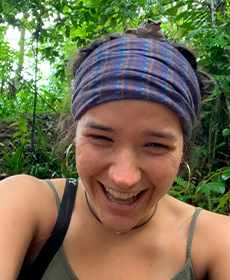
Brenna Barber '22
After graduating from Muhlenberg in May 2022, Brenna spent the summer teaching STEM to 6-11 year olds at my local Boys and Girls Club summer camp. She learned about the importance of biodiversity and pollinators by making wildflower seed bombs, experienced the water cycle as water droplets by playing a life-sized board game of the different places water can travel and explored aquatic macroinvertebrates in the stream. Currently, Brenna is employed at Eurofins Environment Testing as an air analyst, where I am learning to analyze air samples for volatile organic compounds (VOCs) using GC-MS.
Q&A with Brenna
How did your major in environmental science prepare you for your current position?
I paired my environmental science major with a chemistry minor, which gave me lots of lab experience. Having the environmental context to go along with the rigid techniques employed in chemistry labs has been super useful in this position, allowing me to more deeply understand the impacts of VOCs on the local environment and atmosphere as a whole. I was honestly shocked to find myself so eager and excited in this position. While I have always cherished my undergrad lab experiences, I unearthed a passion for ecological field research during my semester abroad in Costa Rica, where I did herpetology research in the rainforest. Since then, I pictured myself continuing down that path, but starting this job made me realize how much I also missed being in labs, preparing samples, and conducting analyses. I'm grateful that my undergrad experiences at Muhlenberg equipped me with a wide variety of skills and knowledge, allowing me to explore so many options in my field after graduating.
Was there a course you took at Muhlenberg that changed your life? Please tell us about it.
There were actually two! And I took them both during my sophomore year. They were honors organic chemistry with Dr. Young and environmental science with Prof. Tuerk. As a freshman, I was totally unsure of which direction I wanted to take my education. Having put way more effort into gen chem than I really wanted to, I was feeling discouraged in that field, but I was invited into the honors section of orgo. After some mild pestering and convincing from my pre-med friends, I decided to enroll. If I hated it, then at least it would be an experience I could tuck under my belt, right? Being in the honors section made the class smaller and much heavier on the lab component, and I loved it SO much. It made me upset that I was feeling so discouraged about chemistry after taking gen chem--I had no idea how much joy I could find in chemistry from solving Dr. Young's challenging synthesis problems to having successful yields in the reactions we performed in the lab. Similarly, I took environmental science on a whim because I remembered enjoying the high school class I took and always kept it in my back pocket as an option for college. I vividly remember a spark of passion being lit during our very first lab, in which we created miniature landfills in order to compare degradation rates of "regular" plastic materials to various "biodegradable" plastics. The course progressed and the next semester we returned and were able to examine the degradation. Even though the results maybe weren't as exciting as we were hoping, this lab inspired an immense love for the process and effort that goes into research projects, and set me up for success in all of my future labs and projects (it even helped when I was teaching my summer camp kids about the scientific method).
What advice do you have for today’s environmental science students?
Trust your gut and don't be afraid to challenge yourself! It's important to understand your own limits, but if I hadn't been open to the challenges that things like organic chemistry (a famously difficult class) or studying abroad were bound to impose, I wouldn't have the memories and experiences that led me to where I am today.
